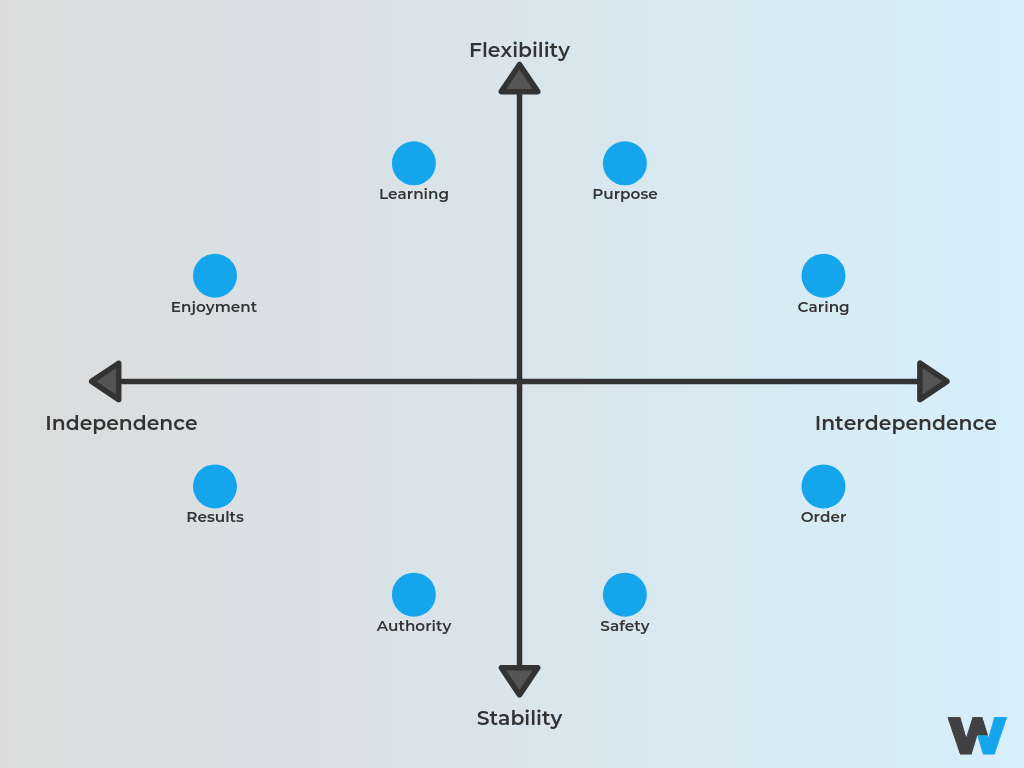8 Common Types of Company Culture

No two businesses’ company cultures are the same, but there are common elements you might notice in many company cultures. According to a Harvard Business Review study, there are two dimensions that exist in most companies:
- People interactions range from independent to interdependent. Highly independent organizations value team members who thrive on their own and tend to measure individual success. Interdependent businesses, on the other hand, measure group success and value employees who work well in teams.
- Change ranges from stability to flexibility. Companies that lean toward stability prefer rules and hierarchy, while organizations that value flexibility favor innovation and diversity.
Blending these two dimensions creates eight distinct cultures. Combine the elements that make the most sense for your small business to build the perfect company culture for you and your staff.

1. Learning
Organizations with learning-based cultures value independence and are extremely flexible. They emphasize professional development and encourage curiosity and innovation. Cultures of learning tend to be filled with “intrapreneurs” and are great for people with open minds who enjoy taking risks.
2. Enjoyment
Cultures of enjoyment also value flexibility and independence. These businesses tend to have an air of playfulness and spontaneity to them. They’re perfect for employees who want to do what makes them happy daily.
3. Results
Results-based companies prefer stability and are highly independent. They focus on the outcome of each project and often don’t worry about the process of getting there. These businesses tend to value achievement and expect their team to consistently meet and exceed their individual goals. Organizations that focus on results are great for individuals who want clearly defined objectives and will push themselves to surpass those.
4. Authority
Corporations that focus on authority prefer independence and value stability. They tend to be competitive and focus on individual strengths and achievements. They are great for workers who are motivated by accomplishing personal goals.
5. Purpose
Purpose-based businesses value interdependence and are highly flexible. These companies tend to be centered around idealism and altruism and may encourage their team members to regularly participate in charities and other programs that benefit the community. They are great for people who are extremely compassionate and want to make the world a better place.
6. Caring
Cultures of caring are highly interdependent and value flexibility. They tend to focus on sincerity and good working relationships, which often leads to a family-like environment. These businesses tend to put the employees’ needs first, which can lead to high levels of engagement and collaboration. They often offer access to professional and personal development programs that will help their team grow as individuals, while building strong relationships with their coworkers. They are great for people who are looking for a supportive workplace.
7. Order
Work environments based on order are highly interdependent and value stability. They are often structured in a traditional top-down hierarchy, and their employees have clear guidelines for all processes. Order-based companies are great for workers who are most comfortable in structured environments.
8. Safety
Organizations focused on safety tend to be highly stable and value interdependence. They tend to be risk-conscious and pragmatic. When presented with a new idea or opportunity, they tend to create a plan, instead of jumping right in. They are great for employees looking for predictable workplaces.
Now that you know more about the types of company culture that exist, learn more about how to create the company culture that is best suited to your business.


